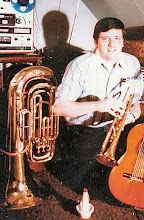Note, the cover used for this EP doesn't have the right catalog number or songs listed. It is the standard cover printed for the LP. The back cover is blank. This EP was used in juke boxes. Liner notes are excerpts from the LP.
Side 1
1. South Rampart Street Parade
2. Basin Street Blues
3. Farewell Blues
Side 2
1. The Darktown Strutters' Ball
2. Put on Your Old Grey Bonnet
3. Over The Waves
Liner Notes:
Personnel:
Pete Fountain, clarinet
Jackie Coon, trumpet
Moe Schneider, trombone
Four-piece Trombone Team:
Lew McCreary (trombone)
Bill Schaefer (trombone)
George Roberts (bass trombone)
Dick Nash or Dick Noel (trombone)
Percussion:
Godfrey Hirsch, vibraharpist
Jack Sperling, drums (snare, cymbal and foot bass drum)
Nick Fatool, field drum
Paul Barbarin, vertical bass drum, cymbal
Rhythm:
Bobby Gibbons, banjo
Phil Stephens, tuba
Morty Corb, bass
SOUTH RAMPART STREET PARADE
PETE FOUNTAIN And His Mardi Gras Strutters
Shrovetide, the period before Ash Wednesday, is a gay and active time of year in New Orleans. This pre-Lenten season culminates, there and in other southern cities, with the processions, masquerade balls and other entertainments associated with Mardi Gras, a day sometimes called Fat Tuesday or Shrove Tuesday.
Every Shrove Tuesday morning in recent years, at 9 a.m., a group of musicians and their non-musician friends have gathered at a tavern on St. Charles Street to launch one of the Crescent City's most colorful ceremonies. Pete Fountain, the founder of this marching society, has gone to some lengths to assure its vivid visibility. Special uniforms, brightly sprayed shoes and plumed hats are among the accouterments that draw undivided attention to the strutting members of the Half Fast Walking Club, as it is officially called.
"I was going down there for this year's parade", says Bud Dant, "to take part in it myself - I played mellophone - and to get a first hand view of the club. Pete's followers included a wide variety of personalities from all walks of life. One member of the parade was Cliff Arquette (Charlie Weaver), who brought along an old Civil War cornet. There was no real semblance of order in the parade, though none of us could go very far astray because the crowd kept us hemmed in".
"We marched for about four hours, all the way up St. Charles Street to Canal, and past the reviewing stand, in front of the Mayor and the television cameras. We played a lot of the same tunes you hear in this album, though of course without the organized sound that the music has here."
The most important link between the actual parade as it took place that day and the music as it is heard in this album is the strong, marching-music element of percussion. Taking part in these sessions was a remarkable quartet of drummers. One was Godfrey Hirsch, regularly Pete's vibraharpist. Here he plays a marching drum. Jack Sperling, drummer on most of the Fountain albums, plays snare, cymbal and occasionally a foot bass drum. Nick Fatool plays a field drum, which is a somewhat thicker snare. And Paul Barbarin, who led a ten-piece band in the parade, plays a vertical bass drum, with a little brass-rim of a cymbal on top. He marched into the studio with this drum, the legend "Onward Brass Band Of New Orleans" inscribed on it, and never sat down through the entire recording.
On Put On Your Old Grey Bonnet and Farewell Blues this percussion team backs up a Dixieland ensemble comprising Jackie Coon on trumpet, Pete on clarinet and Moe Schneider on trombone. On all the other tracks a four-piece trombone team was added, consisting of Lew McCreary, Bill Schaefer, George Roberts (bass trombone) and Dick Nash or Dick Noel.
The rhythm section throughout is composed of Bobby Gibbons, banjo; Phil Stephens, tuba; and Morty Corb, bass.
The tempo accorded to the opening track, the Ray Bauduc-Bob Haggart South Rampart Street Parade, establishes both mood and pace for the entire set. It is neither too slow nor too fast; it just conforms, in fact, to the name of the club. Pete's lower register clarinet hits a fittingly mellow groove on the chorus. The arrangement was written by Don Bagley.
Matty Matlock's arrangement of the Paul Barbarin original The Second Line follows, with Pete riding over the ensemble in a buoyant manner recalling the best of the old Bob Crosby band. Heinie Beau's arrangement of Basin Street Blues pits Pete's melodic statements against the trombone section and places the fine ensemble lead of Coon in sharp focus.
Farewell Blues, an informal performance guided by Dant but virtually a head arrangement, offers more traditional-style Dixie, with impressive work by Schneider, Coon and Fountain.
The Darktown Strutters' Ball, another Beau score, was composed in 1917 by Shelton Brooks of Some Of These Days fame. Moe Schneider's Teagarden-like facility, Pete's purity of sound and style, and Phil Stephens' tuba break are noteworthy points.
Put On Your Old Grey Bonnet, a head arrangement, has an opening statement by Coon, a beautifully meshed Dixieland ensemble, and solos by Fountain, Schneider and Coon, with the percussion section in command.
Over the Waves, a Heinie Beau arrangement, makes ingenious use of Phil Stephens' tuba for a half chorus of melody (to Pete's obbligato) and an amusing coda.
If the music on these sides has the same stimulating effect on you as on this listener, I guess we'll have a date to meet next Mardi Gras morning. Look for those plumed hats, in the vicinity of a tavern on St. Charles Street. And don't forget the struttin' starts at nine - so you'd better be ready about half-
past eight.
- Leonard Feather




No comments:
Post a Comment